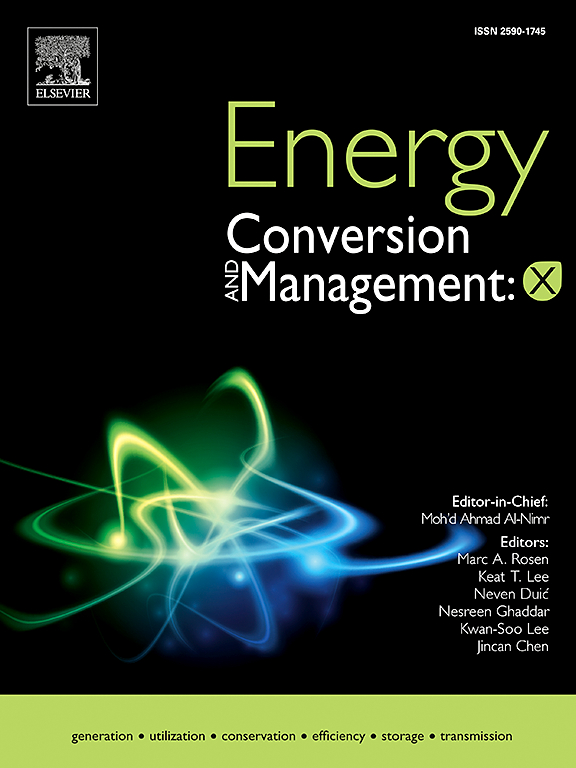An Improved MPC-based energy management strategy for hydrogen fuel cell EVs featuring dual-motor coupling powertrain
IF 7.1
Q1 ENERGY & FUELS
引用次数: 0
Abstract
Hydrogen fuel cell electric vehicles (HFCEVs) provide significant environmental benefits. Integrating dual-motor coupling powertrains (DMCPs) further enhances efficiency and dynamic performance. This article proposes an energy management strategy (EMS) for the hydrogen fuel cell/battery/super-capacitor system in an HFCEV with DMCP. Model predictive control (MPC) is adopted as the framework to optimize economic performance, defined in this study as the hydrogen consumption cost and fuel cell degradation cost. To improve the prediction horizon and accuracy, the torque split ratio for two varying permanent magnet synchronous motors (PMSMs) and the corresponding mode switching rules of the vehicle are initially established. Subsequently, a combination of Dynamic Programming (DP) and MPC is selected as the framework, utilizing a Dung Beetle Optimizer (DBO)-optimized Bidirectional Long Short-Term Memory (BiLSTM) network to refine the predictive model. Finally, comparisons with other predictive models and commonly used control strategies demonstrate that the proposed EMS notably improves economic performance.
基于mpc改进的双电机耦合动力系统氢燃料电池电动汽车能量管理策略
氢燃料电池电动汽车(HFCEVs)具有显著的环境效益。集成双电机耦合动力系统(DMCPs)进一步提高了效率和动态性能。本文提出了一种氢燃料电池/电池/超级电容器系统的能量管理策略。采用模型预测控制(MPC)作为优化经济性能的框架,本文将其定义为氢消耗成本和燃料电池降解成本。为了提高预测的范围和精度,初步建立了两个可变永磁同步电机的转矩分割比和相应的车辆模式切换规则。随后,选择动态规划(DP)和MPC相结合的框架,利用屎壳虫优化器(DBO)优化的双向长短期记忆(BiLSTM)网络对预测模型进行细化。最后,与其他预测模型和常用控制策略的比较表明,所提出的EMS显著提高了经济性能。
本文章由计算机程序翻译,如有差异,请以英文原文为准。
求助全文
约1分钟内获得全文
求助全文
来源期刊

Energy Conversion and Management-X
Multiple-
CiteScore
8.80
自引率
3.20%
发文量
180
审稿时长
58 days
期刊介绍:
Energy Conversion and Management: X is the open access extension of the reputable journal Energy Conversion and Management, serving as a platform for interdisciplinary research on a wide array of critical energy subjects. The journal is dedicated to publishing original contributions and in-depth technical review articles that present groundbreaking research on topics spanning energy generation, utilization, conversion, storage, transmission, conservation, management, and sustainability.
The scope of Energy Conversion and Management: X encompasses various forms of energy, including mechanical, thermal, nuclear, chemical, electromagnetic, magnetic, and electric energy. It addresses all known energy resources, highlighting both conventional sources like fossil fuels and nuclear power, as well as renewable resources such as solar, biomass, hydro, wind, geothermal, and ocean energy.
 求助内容:
求助内容: 应助结果提醒方式:
应助结果提醒方式:


